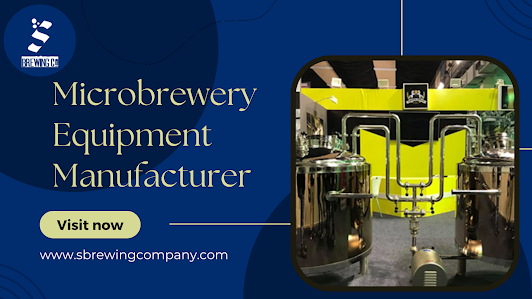The 6 Best Maintenance Tips from the No.1 Microbrewery Equipment Supplier
Introduction
Microbreweries have taken the beer industry by storm, offering beer lovers a variety of craft beers with unique flavors and styles. To consistently produce premium beers, microbreweries rely heavily on their equipment. The quality, cleanliness and good maintenance of this equipment are essential to their success. In this blog, we will dive into the world of microbrewery equipment maintenance and explore the top 6 tips shared by the #1 microbrewery equipment supplier – sbrewingcompany.
1. Clean regularly
Cleaning is the foundation of small brewery equipment maintenance. Keeping your equipment clean ensures your beer is free of unwanted contaminants and maintains the desired flavor. Sbrewingcompany, the No.1 supplier of microbrewing equipment, emphasizes regular cleaning as the foundation of successful brewing.
Fermentation tank: After each batch, clean the fermentation tank thoroughly with a high-quality disinfectant solution. Be sure to remove all residue, yeast, and debris to avoid contamination.
Kettles and boilers: Regularly clean kettles and boilers to remove mineral deposits and dirt. This ensures that your beer's flavor remains consistent.
Plumbing and Hoses: Inspect and clean your brewery's plumbing and pipes. Replace any damaged parts immediately. Dirty or damaged lines can lead to contamination and loss of flavor in your beer.
2. Preventive maintenance
Preventive maintenance is important to avoid unexpected equipment breakdowns and costly repairs. Sbrewingcompany recommends that you establish a regular maintenance schedule to prevent problems before they arise.
Pumps and motors: Check and lubricate them regularly to ensure they operate properly. A faulty pump can disrupt your entire brewing process.
Valves and fittings: Inspect valves and fittings regularly for leaks, wear or corrosion. Replace worn parts to maintain stable tempering conditions.
Heat exchangers: Over time, heat exchangers can become clogged with deposits, reducing their efficiency. Clean and descale periodically to maintain optimal heat transfer.
3. Calibration and monitoring
Precise control of temperature and pressure is essential in the beer brewing process. The brewing company advises microbrewers to invest in accurate pressure gauges and calibrate them regularly.
Temperature control: Calibrate the temperature controller regularly to ensure your beer ferments at the correct temperature. This avoids unpleasant aromas and the production of unwanted esters.
Pressure control: Stable pressure is critical for carbonation and dispensing. Calibrate the pressure regulator to maintain the desired carbonation level in your beer.
4. Lubricate equipment
Lubrication is often overlooked but critical to properly functioning microbrewery equipment. Sbrewing Company recommends the use of food-grade lubricants for moving parts.
O-rings and seals: Make sure all O-rings and seals are well lubricated. This prevents leaks and prolongs the life of these important sealing parts.
Moving parts: Lubricate all moving parts, such as hinges and valves, to prevent wear and reduce the risk of malfunction.
5. Quality water treatment
The quality of water used in the coffee brewing process can have a significant impact on the flavor and consistency of your coffee. Sbrewingcompany understands the importance of water quality and advises microbreweries to invest in suitable water treatment systems.
Filtration: Use a water filtration system to remove impurities and minerals that can affect the flavor of your brews.
Water Testing: Regularly test your water source for contaminants and adjust treatment methods accordingly. Consistent water quality is crucial for consistent beer quality.
6. Record Keeping
Maintaining detailed records of all your brewing processes and equipment maintenance is a practice promoted by sbrewingcompany. This information is invaluable for troubleshooting issues and ensuring consistency in your brews.
Dispensing Log: Keep a detailed dispensing log, including ingredients, time, temperature, and pressure settings. This helps replicate successful batches and identify areas for improvement.
Maintenance Log: Keep records of all equipment maintenance and calibration activities. This allows you to detect trends and potential problems before they become serious.
Conclusion
The success of a microbrewery depends on the quality of the equipment used as well as careful care and maintenance. Sbrewingcompany, the No.1 Microbrewery Equipment Supplier, understands the intricacies of brewing and the essential role that equipment maintenance plays in producing consistent, high-quality brews.
In summary, maintaining a clean brewery, conducting preventative maintenance, calibrating, and monitoring equipment, proper lubrication, water treatment, and detailed record-keeping are the top 6 maintenance tips shared by sbrewingcompany. Following these tips will help microbreweries produce exceptional beer while ensuring the longevity of their equipment. If you're serious about brewing, take a page from the No.1 supplier's book and prioritize equipment maintenance in your microbrewery. Cheers to great beer and successful brewing!




Comments
Post a Comment